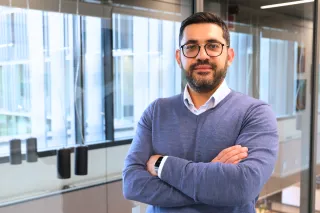Many companies still watch the development of quantum computing from a distance. New technologies have been identified, but companies feel like they cannot apply them anytime soon. In this rapidly developing field, it would be beneficial for companies to start forming a view of the utilisation of quantum computing already. Using VTT’s Future Radar foresight method, we identified quantum opportunities of the financial sector in several time horizons.
VTT is a key actor in the evolving Finnish quantum technology ecosystem. Research on the development of both equipment and algorithms is carried out around Finland’s first quantum computer. In addition, several spin-off companies have already been created. To better understand how quantum computing will affect different sectors, we started forecasting its future opportunities and discussed them with several companies.
Companies have very different attitudes towards quantum computing. There are enthusiastic Finnish actors who have some idea of the possibilities of quantum computing and who have even carried out practical experiments. However, most are still waiting, as the possibilities of quantum computing do not appear concrete enough. Sometimes attitudes are even openly resistant, and the benefits of quantum computing for business are seen as speculative or non-existent.
According to a global study by consulting company Capgemini, as many as 23% of companies plan to work or already work with quantum technologies and expect at least one commercial application within the next 3–5 years. According to a survey conducted by consulting company EY, as many as one third of UK companies have started strategic planning related to quantum computing. However, the situation may vary significantly in different types of companies and regions.
However, as a result of the foresight work, we have noticed that companies should already actively engage in development and consider potential utilisation paths in their own operations. For example, in the financial sector, the pharmaceutical industry and logistics, the benefits of quantum computing are already tangible, and pioneering companies are working on practical development in this area. The time has come for preparing, forming a strategy and, if necessary, taking measures.
What kind of expertise and resources does the utilisation of quantum computing require? What is the role of quantum computing in a company’s business and technology strategy? How can quantum technology change the logic of an entire industry? We can already seek answers to these questions.
Future Radar in anticipating quantum opportunities in the financial sector
We used VTT’s Future Radar approach to identify the opportunities and risks of quantum technology in the financial sector. Based on extensive source materials and expert discussions, we created a radar image discovering dozens of opportunities and risks in five, ten and 20-year time horizons. The identified opportunities were related to complex risk analyses in stock trading, real-time Monte Carlo analysis, algorithmic trading, blockchain security, and anticipation of financial collapses, among other things. We have already found several possibilities in the next five years’ time frame. Many quantum-related threats can turn into opportunities if they are tackled by companies early enough.
Our foresight work was experimental. However, with a relatively small contribution, we found that it is possible to identify the potential for quantum computing in several time horizons in the financial sector. If realised, these benefits may be disruptive in nature. When a company understands the alternative quantum computing trends of the future among the first ones, it can shape the future market by taking immediate action as an early adopter.
The FutureQ research project builds understanding of quantum computing opportunities
In addition to the financial sector, we also outlined the opportunities and threats of quantum computing related to pharmaceutical development and logistics. These three sectors are also at the core of research in the new FutureQ research project, aiming to increase understanding of the impacts of quantum computing on the operating environment of companies and on market formation. We will share accumulating new insights through different channels during the project, and the lessons learned will also be compiled into a publication focusing on the question: “What should your company know about quantum computing?” The project will be implemented in close cooperation with businesses in sectors that are early adopters of quantum computing. The FutureQ project is funded by Business Finland, VTT Technical Research Centre of Finland and participating companies as well as other organisations. Perhaps we will see more pioneering Finnish quantum technology users soon.







